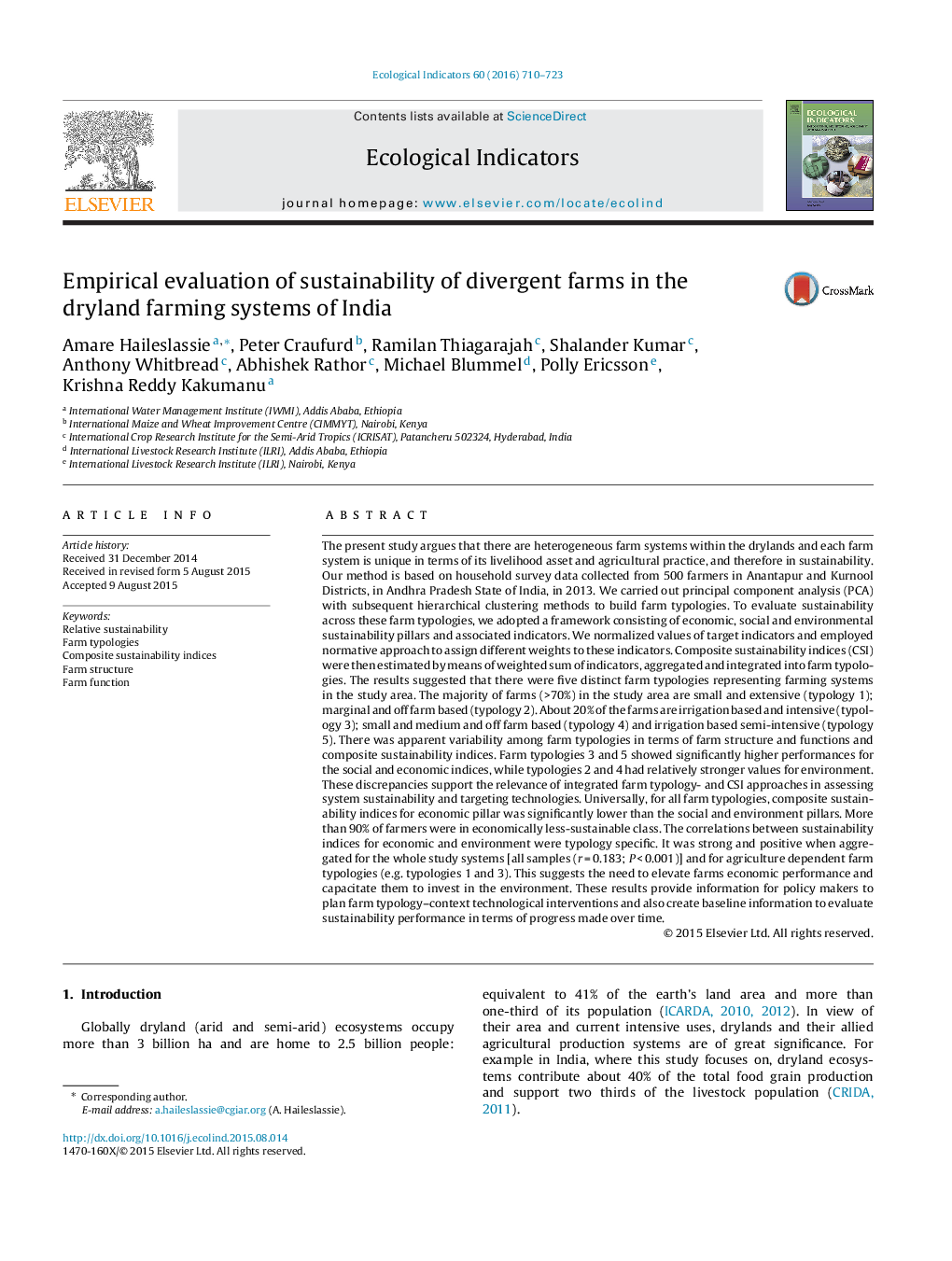| کد مقاله | کد نشریه | سال انتشار | مقاله انگلیسی | نسخه تمام متن |
|---|---|---|---|---|
| 6294139 | 1617141 | 2016 | 14 صفحه PDF | دانلود رایگان |
عنوان انگلیسی مقاله ISI
Empirical evaluation of sustainability of divergent farms in the dryland farming systems of India
ترجمه فارسی عنوان
ارزیابی تجربی از پایداری مزارع واگرا در سیستم های کشاورزی دیم هند
دانلود مقاله + سفارش ترجمه
دانلود مقاله ISI انگلیسی
رایگان برای ایرانیان
کلمات کلیدی
پایداری نسبی، نوع شناسی مزرعه، شاخص های پایداری کامپوزیت، ساختار مزرعه، عملکرد مزرعه،
موضوعات مرتبط
علوم زیستی و بیوفناوری
علوم کشاورزی و بیولوژیک
بوم شناسی، تکامل، رفتار و سامانه شناسی
چکیده انگلیسی
The present study argues that there are heterogeneous farm systems within the drylands and each farm system is unique in terms of its livelihood asset and agricultural practice, and therefore in sustainability. Our method is based on household survey data collected from 500 farmers in Anantapur and Kurnool Districts, in Andhra Pradesh State of India, in 2013. We carried out principal component analysis (PCA) with subsequent hierarchical clustering methods to build farm typologies. To evaluate sustainability across these farm typologies, we adopted a framework consisting of economic, social and environmental sustainability pillars and associated indicators. We normalized values of target indicators and employed normative approach to assign different weights to these indicators. Composite sustainability indices (CSI) were then estimated by means of weighted sum of indicators, aggregated and integrated into farm typologies. The results suggested that there were five distinct farm typologies representing farming systems in the study area. The majority of farms (>70%) in the study area are small and extensive (typology 1); marginal and off farm based (typology 2). About 20% of the farms are irrigation based and intensive (typology 3); small and medium and off farm based (typology 4) and irrigation based semi-intensive (typology 5). There was apparent variability among farm typologies in terms of farm structure and functions and composite sustainability indices. Farm typologies 3 and 5 showed significantly higher performances for the social and economic indices, while typologies 2 and 4 had relatively stronger values for environment. These discrepancies support the relevance of integrated farm typology- and CSI approaches in assessing system sustainability and targeting technologies. Universally, for all farm typologies, composite sustainability indices for economic pillar was significantly lower than the social and environment pillars. More than 90% of farmers were in economically less-sustainable class. The correlations between sustainability indices for economic and environment were typology specific. It was strong and positive when aggregated for the whole study systems [all samples (r = 0.183; P < 0.001)] and for agriculture dependent farm typologies (e.g. typologies 1 and 3). This suggests the need to elevate farms economic performance and capacitate them to invest in the environment. These results provide information for policy makers to plan farm typology-context technological interventions and also create baseline information to evaluate sustainability performance in terms of progress made over time.
ناشر
Database: Elsevier - ScienceDirect (ساینس دایرکت)
Journal: Ecological Indicators - Volume 60, January 2016, Pages 710-723
Journal: Ecological Indicators - Volume 60, January 2016, Pages 710-723
نویسندگان
Amare Haileslassie, Peter Craufurd, Ramilan Thiagarajah, Shalander Kumar, Anthony Whitbread, Abhishek Rathor, Michael Blummel, Polly Ericsson, Krishna Reddy Kakumanu,
